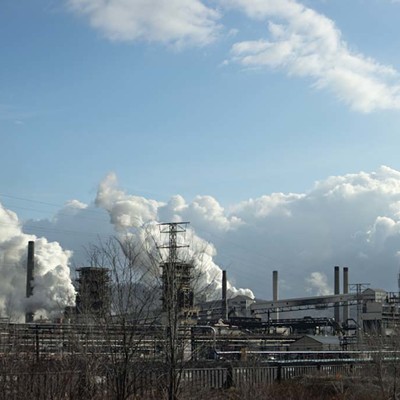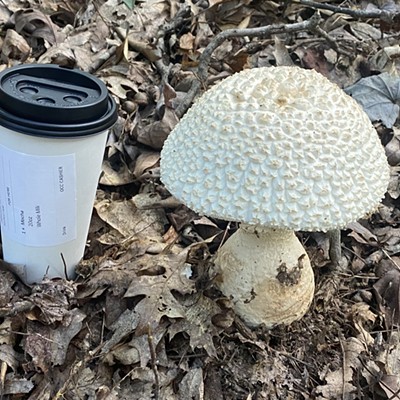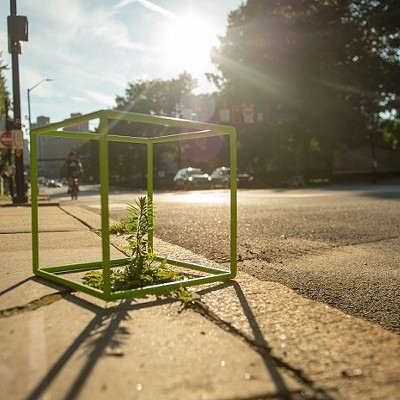In its pamphlet "Sewer Overflows: What Can You Do?," ALCOSAN tells homeowners how to lessen the region's perennial problem of raw sewage flooding its streams during wet weather.
To keep storm- and meltwater from overwhelming the system, the pamphlet advises, homeowners should replace impervious paving with porous pavement, build rain gardens and the like.
Yet in its own $3.6 billion plan to meet federal clean-water mandates, ALCOSAN includes no such "green" solutions. Instead, it proposes expanding its conventional "gray" infrastructure — bigger processing plants and more underground storage tunnels.
Critics of ALCOSAN's Draft Wet Weather Plan say that's a big mistake. During the public-comment process — which concludes Oct. 19 — they've exhorted the authority to learn from other cities and soak up excess water in ways more like Mother Nature.
"This is like the biggest infrastructure investment this area is ever gonna see," says Tom Hoffman of Clean Water Action, among the groups pursuing the issue. "Green infrastructure needs to get a fair shake at least."
As in hundreds of U.S. cities, older sewers here were made to overflow during rainstorms. That protects treatment plants, but pollutes waterways. It happens dozens of times a year, often fouling the water for days. Even newer "sanitary sewers" can overflow.
ALCOSAN's all-gray fix roughly triples treatment capacity and features miles of new pipes and underground tunnels along and across Pittsburgh's three rivers. (The tunnels, 12 feet or more wide, would lie beneath existing tunnels — 180 feet underground.) The $3.6 billion plan would satisfy an EPA consent decree requiring an end to most sewage overflows. But ALCOSAN will ask EPA to approve a $2 billion alternative as more affordable for ratepayers, who under the pricier option could see sewage rates triple.
Green infrastructure can't solve all the problems that arise when rain douses 83 municipalities in ALCOSAN's service area, which occupies 309 square miles of heavily paved and built-upon land. But advocates say a green-hybrid system would be cheaper and have other benefits. Rain gardens and tree plantings, for instance, raise property values and cool urban "heat islands." Letting water soak into the earth rather than pumping it out of tunnels saves enormous amounts of energy. (ALCOSAN's monthly electric bill is $750,000.) And maintaining green infrastructure could even create more long-term jobs.
The EPA encourages green stormwater control; other cities are already doing it; and even Allegheny County Executive Rich Fitzgerald says he's pushing ALCOSAN to put more green in its plan. Why not us?
Basically, says ALCOSAN, because most green techniques involve either private property (roofs, parking lots) or municipal land (streets, parks) whose use the authority can't control. Each of those 83 municipalities owns its own sewer system, which feeds into ALCOSAN's lines. Philadelphia's much-touted, all-green wet-weather plan, notes ALCOSAN spokesperson Nancy Barylak, works because city government and the sewage authority are one: The city has simply mandated permeable paving and rain gardens. Meanwhile, regions like Milwaukee use green strategies to supplement massive gray infrastructure they've already upgraded.
Some observers say ALCOSAN is doing its best. Ronald Neufeld, a professor of civil and environmental engineering at Pitt, says that while green infrastructure is valuable, gray infrastructure is ALCOSAN's clearest path to fulfilling the consent decree by 2026.
ALCOSAN does go green when it can, Barylak adds. For instance, it's working with municipalities to "daylight" streams formerly piped into sewage lines, which has so far removed 695 million gallons a year from the system.
Ultimately, though, the key might not be ALCOSAN, but those 83 towns — each of which owes its own stormwater plan to state and county officials by July. Indeed, Pittsburgh already requires green stormwater management on publicly funded projects. Mount Lebanon charges landowners for their stormwater runoff.
But financially strapped towns won't get there very fast by themselves, says John Schombert. As director of the nonprofit Three Rivers Wet Weather, Schombert believes the region should consider consolidating its sewer system, "or we will not have a sustainable solution," he says. However, he adds, "With proper education, most elected officials will say, ‘Please take my sewer system.'"














